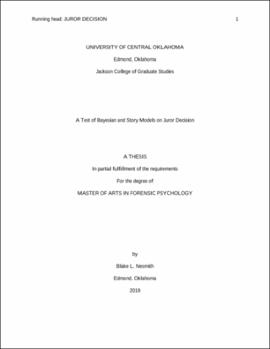| dc.contributor.advisor | Hancock, Thomas | |
| dc.contributor.author | Nesmith, Blake L. | |
| dc.date.accessioned | 2020-07-09T14:41:35Z | |
| dc.date.available | 2020-07-09T14:41:35Z | |
| dc.date.issued | 2019 | |
| dc.identifier.other | (AlmaMMSId)9982673580002196 | |
| dc.identifier.uri | https://hdl.handle.net/11244/325124 | |
| dc.description.abstract | Juror decision-making involves the individual's evaluation of evidence in court.There are two major types of models: mathematical and explanation. Both models make specific, contrasting assumptions of juror decision-making, but few studies have compared both models with the same experimental paradigm. The current study compared information integration/Bayesian models mathematical) to story models (explanation) using the same paradigm. A bias was introduced before evidence evaluation began. Participants read one of three narratives designed to bias their perception of the defendant towards a guilty, innocent, or neutral stance. Participants freely selected among six items of evidence (three eyewitnesses and three physical items), and each item had four additional sub-evidence items (two suggest guilt and two suggest innocence) they rated for guilt using a 10-point Likert scale. Results from the study suggest jurors use a combination of both models when evaluating evidence, but the methodology forced participants to use Bayesian methods, making it difficult to interpret. The bias introduced at the beginning of the study did not affect final verdict choice, and selection order did not affect the final verdict. However, there was a difference in selection order by condition, suggesting bias was present and influencing what items were selected. These findings suggest participants may have been inoculated against bias due to study methodology of making guilt ratings after each sub-evidence item. | |
| dc.rights | All rights reserved by the author, who has granted UCO Chambers Library the non-exclusive right to share this material in its online repositories. Contact UCO Chambers Library's Digital Initiatives Working Group at diwg@uco.edu for the permission policy on the use, reproduction or distribution of this material. | |
| dc.title | A test of Bayesian and story models on juror decision. | |
| dc.type | Academic theses | |
| dc.contributor.committeeMember | Mather, Robert | |
| dc.contributor.committeeMember | Mabry, John | |
| dc.thesis.degree | M.A., Forensic Psychology | |
| dc.subject.keywords | Bayesian | |
| dc.subject.keywords | Decision-making | |
| dc.subject.keywords | Information integration | |
| dc.subject.keywords | Juror | |
| dc.subject.keywords | Predecisional distortion | |
| dc.subject.keywords | Story models | |
| dc.identifier.oclc | (OCoLC)1120935780 | |
| uco.group | UCO - Graduate Works and Theses::UCO - Theses | |
| thesis.degree.grantor | Jackson College of Graduate Studies. | |
